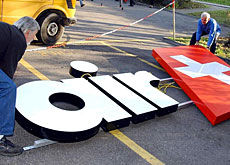Ex-Swissair employees remain wary of trial

Many past employees of former national carrier Swissair do not hold out much hope that justice will be done at the trial of the defunct airline's top management.
The grounding of the company more than five years ago signalled mass layoffs for the staff. Not everybody managed to find a job afterwards, and some are still struggling to make ends meet.
The airline’s collapse in 2001 – the biggest corporate failure in Swiss history – came as a shock to the country and the company’s staff. In all, around 9,000 people lost their jobs.
More than half found work at Swiss International Air Lines, the new company created out of the regional carrier, Crossair, and the remains of Swissair.
Many moved into the banking and insurance sectors, while others opted for the railways or the hospitality industry.
However, others found it much harder. These included not only people with few qualifications, foreigners and the disabled, but also some pilots, technicians and former managers.
But some, especially those with fewer qualifications, foreigners and the disabled, but also some pilots, technicians and former managers, found it much harder.
“I was lucky,” recalls a former top manager at Swissair, who like many other ex-employees prefers to remain anonymous. “I straightaway found a similar position.”
“However, some of my colleagues stayed unemployed for years. [Some were] people who had spent 20 or 30 years in the company and had invested all their money in it,” he told swissinfo.
Another blow was that Swissair liquidator, Karl Wüthrich, decided not to give a social plan to managers, who are currently taking legal action over the issue.
Low expectations
The former manager does not expect much from the current trial near Zurich of ex-board and top management members over the collapse.
“We will never know the truth, the rot had set in too far… but I think Swissair’s fall already started in 1998, when the then CEO, Philippe Bruggisser, started to hire managers who knew nothing about aviation or the Swiss way of doing things,” he said.
“It was from then onwards that the Swissair company climate really started to deteriorate.”
This view is largely shared by other former staff members, who have not turned out in great numbers at the district court proceedings in Bülach.
Only the appearance of Mario Corti, the last Swissair CEO, who remains appreciated for his efforts during the difficult times, created any significant interest.
The pilots’ union Aeropers also believes that the trial will not shed any more light on what really what happened.
“What I am expecting at best is that in future, people in large companies will be stopped from taking such wrong decisions, and control mechanisms will work better,” Aeropers president Christian Frauenfelder told swissinfo.
Hardship cases
Other former employees are also still looking for work. “I am now starting to lose hope of finding a permanent job,” says a woman who used to work for catering company Gate Gourmet, formally part of Swissair.
The 49-year-old, who also wishes to remain anonymous, has relied on welfare payments and temporary catering jobs to get by since the grounding.
Recently she has been following a nursing course financed by the Stiftung Härtefälle, a foundation for hardship cases among former Swissair employees.
“I am separated and have a small girl, at the moment I can’t accept shift work that goes on until late or at night, just the type that I am always being offered,” she explained.
For this former staff member, the Swissair trial is the least of her worries. She will soon no longer be able to rely on the foundation’s help. It will close in March, having helped hundreds of other people get back on their feet.
swissinfo, based on an Italian article by Raffaella Rossello
Swissair planes were grounded in October 2001, after the company had been in business for 71 years.
The downturn in the aviation market after the terrorist attacks of September 11, 2001, proved the last straw for the heavily indebted Swissair, which folded the following year.
The airline collapsed because it over-extended itself by buying stakes in numerous loss-making airlines, including Belgium’s Sabena and Poland’s Lot, in an attempt to form its own airline alliance.
The remains of Swissair and the regional carrier Crossair were brought together in 2002 to form the new national carrier Swiss, which was in turn taken over by Germany’s Lufthansa in 2005.
The trial of former Swissair board members and management started at a court in Bülach on January 16. It is due to finish on March 9.
Charges include damaging creditors, mismanagement, making false business statements and forging documents.
Prosecutors have requested a six-month prison sentence and a penalty of SFr1.08 million ($890,000) for the last Swissair CEO, Mario Corti, and a range of suspended sentences and fines for 18 other airline executives, board members and consultants.
Most of those concerned – many from Switzerland’s business elite – have protested their innocence. Some have refused to testify at the trial.
A second civil trial is due to deal with the airline’s accounts before the collapse.

In compliance with the JTI standards
More: SWI swissinfo.ch certified by the Journalism Trust Initiative










You can find an overview of ongoing debates with our journalists here . Please join us!
If you want to start a conversation about a topic raised in this article or want to report factual errors, email us at english@swissinfo.ch.